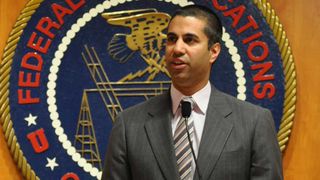Pai: Twitter Is Bigger Threat to Open Net Than ISPs

FCC chair Ajit Pai tore into edge providers Tuesday (Nov. 28) in a speech in which he defended deregulating ISPs.
Pai told a Future of Internet Freedom conference in Washington that edge providers like Twitter are a bigger threat to the Open Internet than internet service providers, who were targeted as the gatekeepers under his Democratic predecessor, Tom Wheeler. He says edge providers "routinely block and discriminate" and the government should not abet their efforts to dominate the internet.
Related: Pai Issues Net Neutrality 'Facts'
In a speech in which Pai defended his order to roll back Title II, he said that some Silicon Valley players have been criticizing the plan--he singled out Twitter in particular--as a threat to the open internet, consumer choice and free expression.
Pai countered that it was Twitter that was discriminating on the basis of content, and edge players in general that were the ones discriminating on the basis of viewpoint.
"Now look: I love Twitter, and I use it all the time," he said. "But let’s not kid ourselves; when it comes to an open Internet, Twitter is part of the problem. The company has a viewpoint and uses that viewpoint to discriminate.
"As just one of many examples, two months ago, Twitter blocked Rep. Marsha Blackburn [the Republican chair of the House Communications subcommittee who helped overturn FCC broadband privacy rules] from advertising her Senate campaign launch video because it featured a pro-life message. Before that, during the so-called [net neutrality] Day of Action, Twitter warned users that a link to a statement by one company on the topic of Internet regulation “may be unsafe.” And to say the least, the company appears to have a double standard when it comes to suspending or de-verifying conservative users’ accounts as opposed to those of liberal users. This conduct is many things, but it isn’t fighting for an open Internet."
Pai called out others for similar actions, saying Twitter was not an outlier.
Related: Pai's Net-Neutrality Plan Under Cyber (Monday) Attack
Broadcasting & Cable Newsletter
The smarter way to stay on top of broadcasting and cable industry. Sign up below
"[D]espite all the talk about the fear that broadband providers could decide what Internet content consumers can see, recent experience shows that so-called edge providers are in fact deciding what content they see. These providers routinely block or discriminate against content they don’t like. "
He used as examples an app store barring apps from cigar aficionados as promoting tobacco use, or "streaming services restricting videos from the likes of conservative commentator Dennis Prager on subjects he considers 'important to understanding American values.'"
Pai took aim at algorithms for deciding what content web users see or don't, but aren't disclosed. Then there were the "online platforms secretly editing certain users’ comments. And of course, American companies caving to repressive foreign governments’ demands to block certain speech—conduct that would be repugnant to free expression if it occurred within our borders," he added.
He said for all those reasons the edge was a bigger threat to the open net than broadband providers, particularly when it comes to viewpoint discrimination. "That might explain why the CEO of a company called Cloudflare recently questioned whether “is it the right place for tech companies to be regulating the Internet.” He didn’t offer a solution, but remarked that “what I know is not the right answer is that a cabal of ten tech executives with names like Matthew, Mark, Jack, . . . Jeff are the ones choosing what content goes online and what content doesn’t go online.”
He said Silicon Valley may be cloaking its advocacy in the public interest, but it was their interests they were interested in, which meant "using the regulatory process to cement their dominance in the Internet economy."
“I’m pleased that Chairman Pai made the point today that the so-called ‘edge companies’ are a bigger threat to viewpoint discrimination and consumer choice on the Internet than the Internet service providers," said Randolph May, president of free market think tank Free State Foundation. "There are certainly more examples of Twitter, Facebook, Google, and others exercising censorship based on viewpoint than there are of the ISPs engaging in such conduct, and Pai called them on it. It takes considerable credulity to believe that AT&T and Comcast today have more power as ‘gatekeepers’ than Google and Facebook. I think they all have First Amendment rights, but let’s don’t deceive ourselves about market power and the disposition to discriminate based on viewpoint."
Chip Pickering, CEO of INCOMPAS, whose members include major Silicon Valley edge providers, said Pai's attack on the edge was simply a diversionary tactic.
"Chairman Pai’s attack on Twitter is like a boxer losing a fight and taking wild and erratic swings," he said. "Preventing hate speech and bullying behavior online is not the same thing as allowing cable companies to block, throttle and extort money from consumers and the websites they love. Twitter is an amazing platform for left, right and center. Donald Trump might not be President without it, and Chairman Pai's plan to kill net neutrality will put Comcast and AT&T in charge of his Twitter account."
Contributing editor John Eggerton has been an editor and/or writer on media regulation, legislation and policy for over four decades, including covering the FCC, FTC, Congress, the major media trade associations, and the federal courts. In addition to Multichannel News and Broadcasting + Cable, his work has appeared in Radio World, TV Technology, TV Fax, This Week in Consumer Electronics, Variety and the Encyclopedia Britannica.

